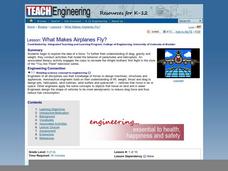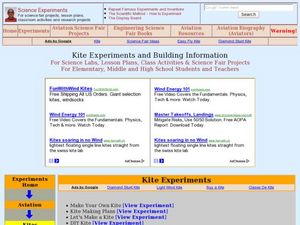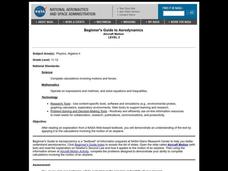Teach Engineering
Take Off with Paper Airplanes
Let's go fly a kite ... oops, a paper airplane! The 13th segment in an aviation unit of 22 relates the parts of an airplane to paper airplanes. Pupils learn the functions of the control surfaces of a plane to really make their knowledge...
Curated OER
Wright Again: 100 Years of Flight
Aspiring aeronautical engineers demonstrate different forces as they construct and test paper airplanes. This lesson plan links you to a website that models the most effective paper airplane design, an animation describing the forces...
Curated OER
Exploring Aerodynamics
Young scholars explore aerodynamics. In this aerodynamics instructional activity, students study the flight patterns of three paper airplanes and discover the underlying principles of aerodynamics. Resources and grade level modifications...
Curated OER
Bubble-ology and Bernoulli
Students explore aerodynamics and Bernoulli's principle by devising ways to keep bubbles aloft.
Curated OER
Forces, Controls And Aircraft Systems
Students are introduced to the physics of flight through video and PowerPoint presentations. They construct and fly model gliders and compete for height, distance, time, etc.
Curated OER
Aviation, Aeronautics and Aerodynamics
Students investigate the physics of flight through various experiments. In this physics lesson, students construct different flying objects. They explain the dynamics that make these object fly.
Cornell University
Physics of Flight
Up, up, and away! Take your classes on a physics adventure. Learners explore the concepts important for flight. They experiment with the Bernoulli Principle while learning the forces that act on airplanes in flight.
Curated OER
Paper Airplanes
Students study paper airplanes. In this lesson on aerodynamics, students print out the folding directions for making paper airplanes and after making the planes test their paper airplanes to see how well each flies. Students weigh...
Curated OER
Science: Flight Aerodynamics
Students apply the principles of aerodynamics by constructing styrofoam airplanes. By using simple tools and materials, they improve their spatial visualization abilities while increasing motor skills. After small groups of students...
Curated OER
Aerodynamics
Pupils discover the basic principles of aerodynamics, including the roles and identity of natural forces involved. They examine how the force of gravity is overcome by the curved shape of an airplane wing and air pressure.
Curated OER
What Makes Airplanes Fly?
Students examine force and conduct activities that model parachutes and helicopters. In this airplanes lesson students identify the forces that make airplanes fly higher and land.
Curated OER
Kite Experiments and Building Information
Learners build their own kite following certain procedures. In this physics lesson plan, students explain the aerodynamics concepts involved in flying kites. They trace the development of aviation.
Curated OER
Cruising Aircraft and Balanced Forces
Students, after reading an explanation from a NASA Web-based textbook, demonstrate an understanding of the text by applying it to questions involving cruising aircraft and balanced forces.
Yale University
Airplane Mathematics
The history of aerodynamics is rich with experimentation and international collaboration. Author Joyce Bryant relays this dynamic past and provides math word problems using the formula of lift, the force that makes airplanes fly. She...
Curated OER
Aircraft Motion
Students, after reading an explanation from a NASA Web-based textbook, demonstrate an understanding of the text by applying it to the calculations involving the motion of an airplane.
Curated OER
Aircraft Motion
Students, after reading an explanation from a NASA Web-based textbook, demonstrate an understanding of the text by applying it to the calculations involving the motion of an airplane.
Curated OER
Aerodynamics of a Boomerang
Students examine how aerodynamic forces affect the flight of aircraft, animals and sports balls and projectiles (like a javelin or boomerang). They discover the origins of the boomerang and early usage in hunting.
Teach Engineering
Airplane Tails and Wings: Are You in Control?
Keep everything under control. The lesson, the 16th segment in a 22-part unit, provides a more detailed look at the parts of a plane, specifically the control surfaces. Pupils learn about the construction of the wings and the tails and...
Curated OER
The Physics of Flight
Three activities allow young flight engineers to understand the 4 principles of flight (weight, lift, thrust, and drag), to construct a glider, and to create a propeller. Multicultural history and literature are integrated by reading...
Teach Engineering
May the Force Be With You: Drag
Do not let friction drag you down! The 11th segment in a series of 22 focuses on the fourth force acting upon an airplane—drag. Pupils learn about the effects and causes of drag.
Curated OER
Airplane Wings
Students examine the aerodynamics of a wing and how it generates lift. In this flight lesson students complete several experiments including how to build a paper plane and how airfoils affect performance.
NASA
The X-1 Paper Glider Kit
After reading an interesting account of how the X-1 aircraft was designed, built, and utilized, young engineers try their hand at constructing a paper glider version of the airplane. They cut out the plane out of a nicely designed...
Curated OER
The Wright Stuff
In this instructional activity, students design an exhibition on the history of aviation for a science museum. For homework, they write short stories envisioning the future of flight in the year 2014.
Curated OER
Forces on an Airplane and Resulting Motion
Students read from a NASA Web-based textbook, then students demonstrate an understanding of the text by answering questions about the forces on an airplane and their resulting motions.























